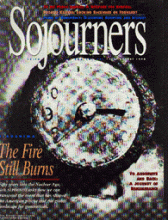When Gar Alperovitz's first book, Atomic Diplomacy: Hiroshima and Potsdam, was originally published in 1965, it challenged conventional thinking about the United States' decision to drop the atomic bomb on Hiroshima on August 6, 1945.
Since then Alperovitz has become a leading expert on the factors and decision-making process around the use of nuclear weapons. An updated edition of Atomic Diplomacy was published by Pluto Press to mark the 50th anniversary of the Hiroshima bombing. The Decision to Use the Atomic Bomb (Alfred A. Knopf), his latest book, will be released in August.
Gar Alperovitz is president of the National Center for Economic Alternatives and a fellow of the Institute for Policy Studies in Washington, D.C. He was interviewed in Washington in May by Sojourners' Jim Rice and Aaron Gallegos.
-The Editors
Sojourners: You've been involved in this issue for a long time. How did you first begin to look into the decision to use the bomb?
Gar Alperovitz: I was not planning to do a book on the atomic bomb. In the late 1950s, I was starting research on my Ph.D. thesis on how U.S. plans for shaping the post-World War II economic order and how U.S. officials thought about this during the war. I entered through this back door of looking at early Cold War issues and the role of the bomb in shaping U.S. diplomatic strategy, not why they dropped the bomb.
Sojourners: What's the consensus among experts about the decision to bomb Hiroshima? Was it necessary to use the bomb to forestall an invasion of Japan?
Alperovitz: The use of the atomic bomb, most experts now believe, was totally unnecessary. Even people who support the decision for various reasons acknowledge that almost certainly the Japanese would have surrendered before the initial invasion planned for November. The U.S.
Read the Full Article

